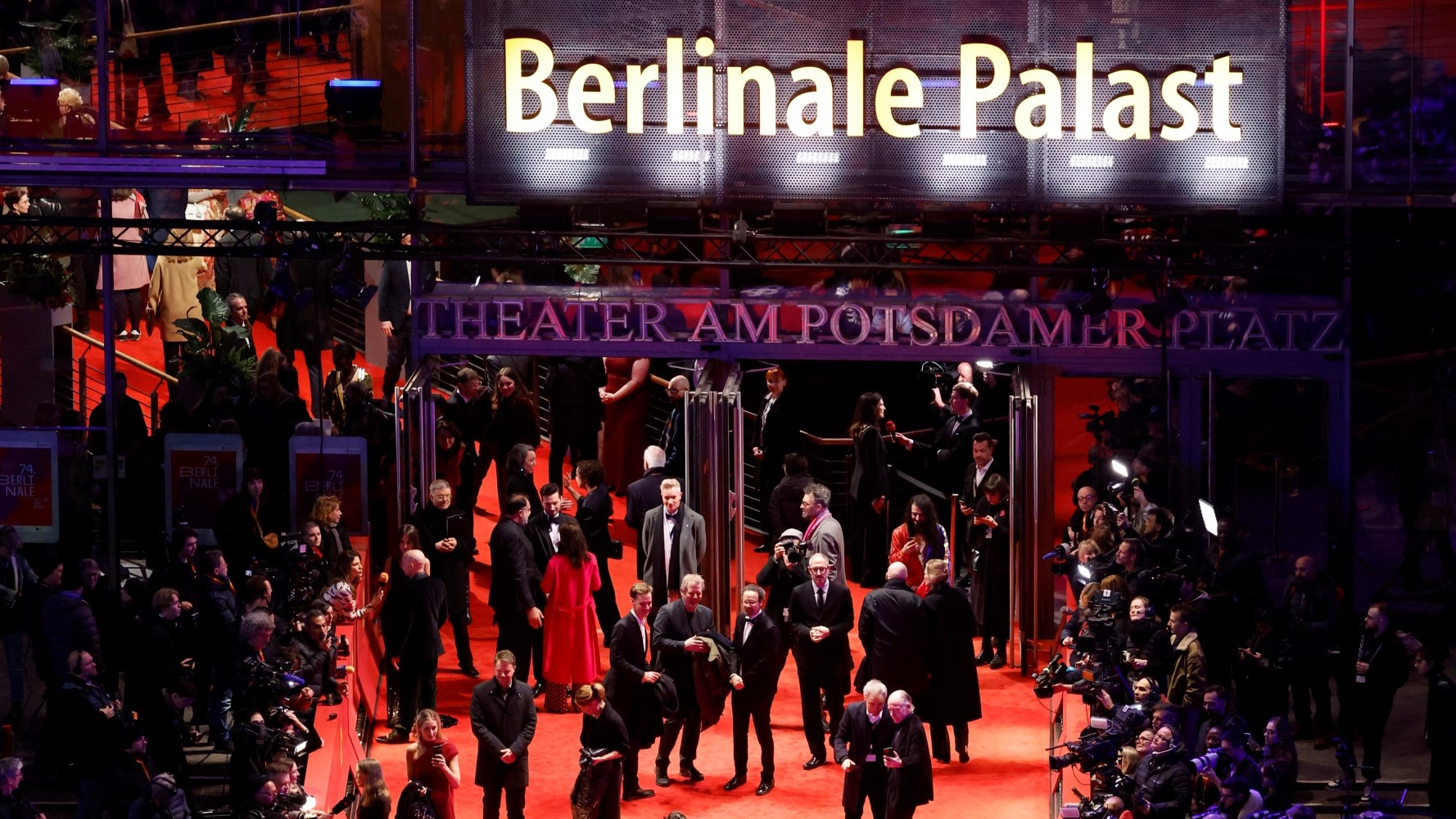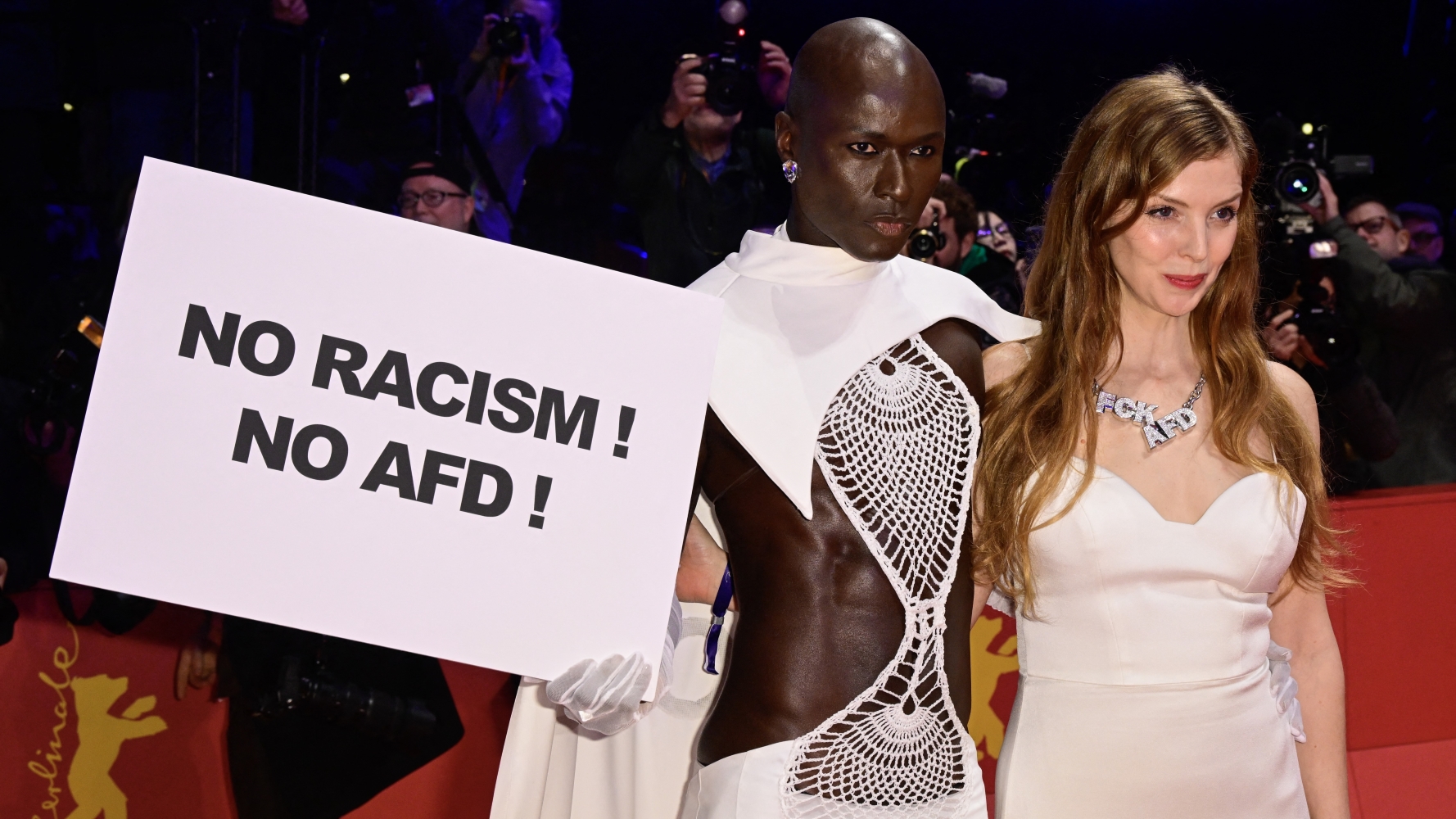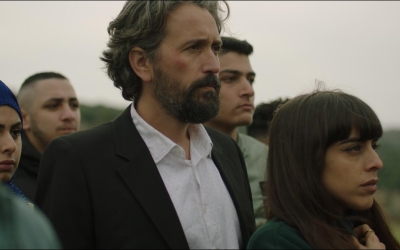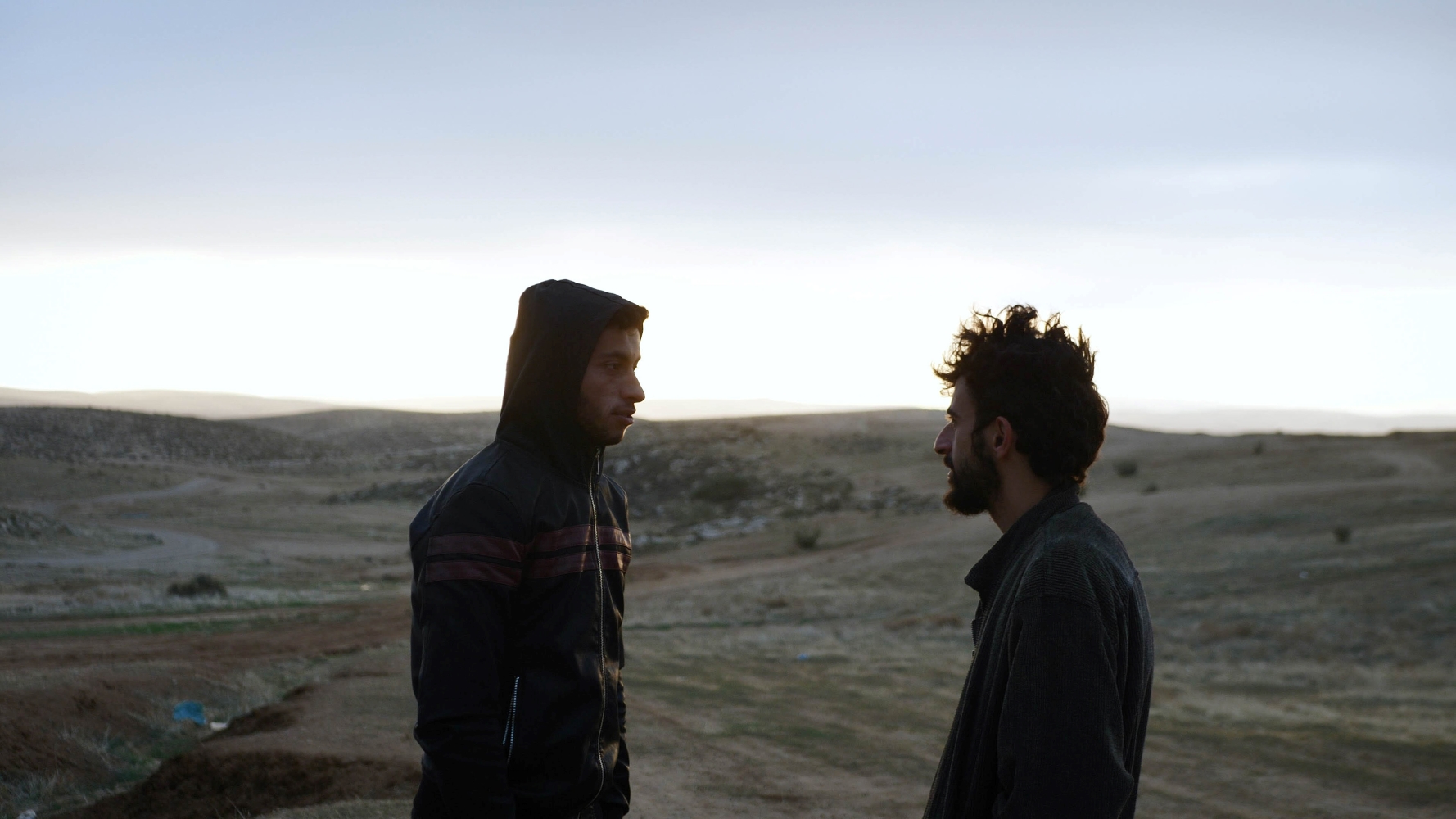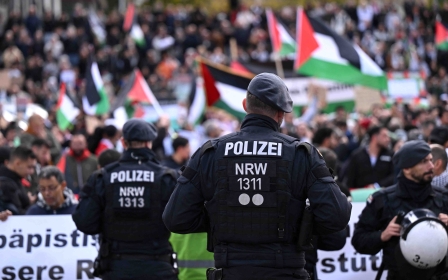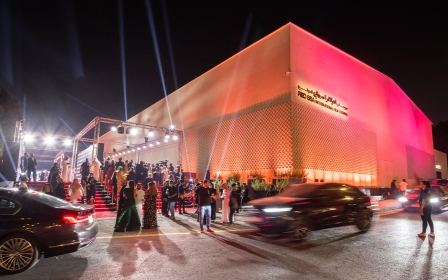Berlin Film Festival: How the politics of Gaza almost crashed the Berlinale
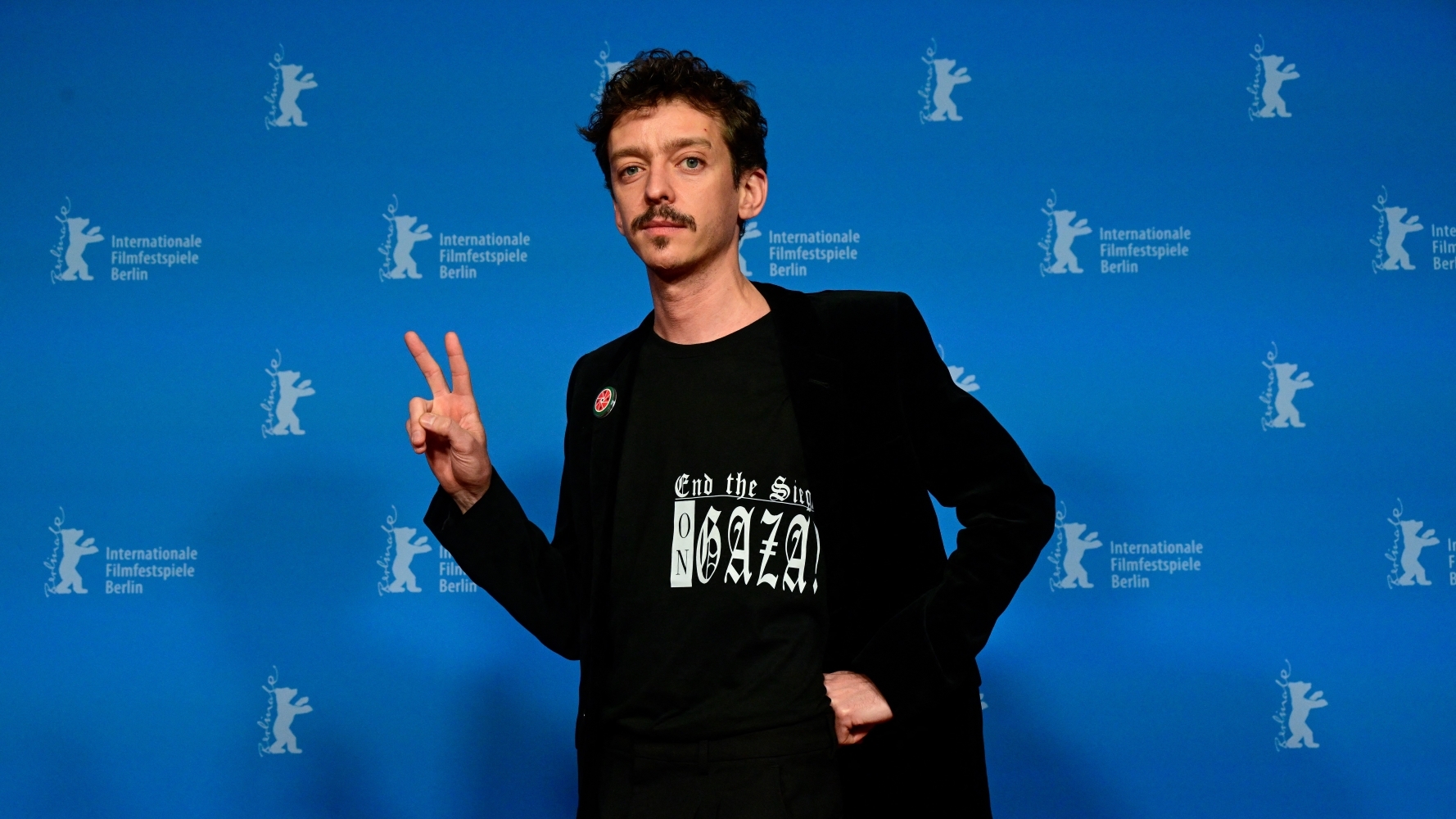
To dub the 74th Berlin International Film Festival, held between 15 and 25 February, as an unflattering example of PR mismanagement would not be an understatement.
Its outgoing directors, Italian film curator Carlo Chatrian and Dutch film executive Mariette Rissenbeek, have endured a series of catastrophes during their five-year tenure.
Those included the Covid-19 pandemic and the Russian invasion of Ukraine in 2022. None of those mishaps, however, have proven to be as damaging as the ongoing Israel-Palestine war.
Open opposition to the far-right Alternative For Germany (AfD) party amongst organisers stands in contrast to the subdued reaction to Israeli aggression in Gaza. It has also brought attention to significant divisions within Germany's left.
The Berlinale, like many other cultural organisations in Germany, has found itself thrust into a storm it’s failing to weather.
New MEE newsletter: Jerusalem Dispatch
Sign up to get the latest insights and analysis on Israel-Palestine, alongside Turkey Unpacked and other MEE newsletters
To date, all major film festivals, including Cannes, Venice, Toronto, and Sundance, have not taken a stance on Gaza or called for a ceasefire. That was not the case with the Ukraine war and the Mahsa Amini protests in Iran.
More so than any other festival, the Berlinale has prided itself on being an unabashedly political festival. That reputation was nurtured and promoted by previous director Dieter Kosslick, who was the first amongst festival chiefs to speak out against Donald Trump in 2016.
The Berlinale was also a pioneer in queer cinema with its introduction in 1978 of the Teddy Award and the gender-neutral acting category in 2021.
It celebrated the Arab Spring in 2012 and awarded its top prize to Jafar Panahi in 2015 when he was under house arrest in Iran.
Chatrian tried to marry the liberal politics of the festival with first-rate film curation that reflected his aesthetic sensibilities and the evolving language of film.
He also gave both the German Ministry of Culture and the festival's sponsors the obligatory big stars and lavish red carpets.
In his previous tenure heading Switzerland’s Locarno film fest, Chatrain steered away from Berlin’s brand of self-congratulatory and superficial leftist politics.
The Berlinale had different rules, however, and he had to follow the institution’s lead.
Walking the middle ground
But both Chatrian and Rissenbeek were ill-equipped to deal with Germany’s current venomous and frenzied political landscape. It started with the fest’s feeble and awkward press release of 19 January.
“Our sympathy goes out to all the victims of the humanitarian crises in the Middle East and elsewhere,” it read.
“We want everyone's suffering to be recognized and for our program to be open to discussing different perspectives on the complexity of the world. We are also concerned to see that anti-Semitism, anti-Muslim resentment, and hate speech are spreading in Germany and around the world.”
The statement was issued when the Palestinian death toll was nearing the 21,000 mark.
However, there was no mention of Palestine in the announcement; no call for a ceasefire; and a clear implication that Palestine and Israel stand on similar ground, sharing identical suffering. The statement, in other words, equated the aggressor with its victim.
The press release was vague, ill-worded, and maddingly apolitical, worlds away from past statements on Ukraine and Iran.
It adhered closely to the middle-of-the-road position forced upon every state-sponsored organisation in Germany (the Ministry of Culture remains the main financial backer of the fest).
To rub salt into the wound, the festival set out to create an exchange platform it named “Tiny Houses” operated by a team of Israelis and Palestinians.
The various activists, filmmakers, and programmers I’ve spoken to see these “Tiny Houses” as enclosed spaces to keep overtly political and heated discussion at arm’s length from the main film activities.
Far-right invites
A storm started to take full shape when a petition surfaced two weeks ago revealing that the Berlinale has invited a number of the AfD members to its opening ceremony – a standard procedure whereby all members of the Bundestag’s culture committee receive an invitation for the event.
The invitations were sent a few weeks after it was revealed that the AfD had secret meetings with neo-Nazi groups to discuss the possibility of mass deportations of migrants, asylum seekers, and German citizens of foreign origin.
The petition was signed by more than 200 film practitioners and made headlines the world over. The Ministry of Culture defended the decision, saying that the decision was “in accordance with democratic practice and the federal government’s respect for the parliament and its elected delegates".
Organisers at the Berlinale initially used the same rationale to justify the invitations, although adding a caveat in their initial statement that: “People – including elected representatives – who act contrary to our fundamental values are not welcome at the Berlinale.”
After mounting pressure, the Berlinale reversed its decision, disinvited the AFD members, and stressed in their second statement that: “The AfD and many of its members and representatives hold views that are deeply contrary to the fundamental values of democracy.
“Demands for a homogeneous society, immigration restrictions and mass deportations, homophobic, queer-hostile and racist remarks, as well as severe historical revisionism and outright right-wing extremism – can be found at the AfD.”
The statement stood in contrast to Mariette Rissenbeek’s disastrous interview before the festival started in which she claimed that the festival doesn’t strive to position itself politically, “especially in times when we don’t know where politics are heading”.
Rissenbeek’s statement angered Berliners, including novelist Fatma Aydemir. In a Guardian opinion piece, she wrote: “How could an international film festival taking place in the capital city only weeks after these deeply shocking plans surfaced be unaffected by this? And what is an apolitical cultural event anyway?”.
The storm continued into the opening day. In the uneasiest press conference this writer has witnessed in 15 years of covering the Berlinale, members of the competition jury were hammered with political questions that ranged from the mandatory AfD invitations to the Catalan filmmaker and jury member Albert Serra’s admiration for Vladimir Putin, and Gaza of course, which German filmmaker Christian Petzold shrugged off.
“I would love to go to a non-political festival,” he responded. “I don’t think that artists talking about Gaza, Ukraine and the AfD is what it’s all about. It’s about film.”
The Palestinian question
Gaza nevertheless became the main talking point. Two days before the festival kicked off, several Berlinale workers stated on Instagram that they were calling for a ceasefire, something senior executives have avoided to this day.
“We recognize the current limits imposed on speech,” the statement said.
“We want to hold the festival and ourselves to a higher standard. An international platform such as the Berlinale and we, in our roles as programmers, consultants, moderators, facilitators, and space holders, alongside further Berlinale workers, can and should voice dissent at the current assault on Palestinian life,” it continued.
On day one, former Berlinale winner and American director Eliza Hittman, had “ceasefire now” stitched onto her outfit.
'We want to hold the festival and ourselves to a higher standard'
- Berlinale workers' statement
Michael Stutz, head of the Panorama competition, called for an end to killing in Gaza and the return of hostages at the section's opening ceremony.
At the Forum Expanded sidebar, several filmmakers withdrew their films in solidarity with Strike Germany, a movement calling for the boycott of German state cultural institutions for their censorship of pro-Palestinian voices, while the curators of the section also joined the call for an immediate ceasefire.
On Sunday, pro-Palestine protests rocked the festival’s market at the Martin Gropius Bau with nearly 50 demonstrators shouting “stop the genocide”.
Lofty words about the need for dialogue and “no space for hatred”, as Rissenbeek put it at the opening ceremony rang hollow in light of the unprecedented silencing and prosecution of Palestinian and pro-Palestinian voices in Germany – a reality the local press has been finally acknowledging in the past few days.
No Other Land
Could the Berlinale have done more to address Arab and pro-Palestinian grievances? It certainly could have. Did Rissenbeek and Chatrian mishandle both the AfD invitations debacle and the silence over Gaza? They probably did, especially after the junior workers at the festival went and risked their careers by publishing the ceasefire petition.
But pinning the entire burden of responsibility on the outgoing directors would be injudicious based on the numerous and contradictory behind-the-scenes accounts this writer has received.
It remains unclear who is pulling the strings at the Berlinale, and it’s the utter lack of transparency, especially from the Minister of Culture, that has led to the endless stream of conspiracy theories and gossip.
The main ethical problems of the festival are structural and institutional, and not individual.
All other state-financed institutions in Germany, most of Europe, and the US have been juggling with the same shambolic policies informed by governments that remain hostile to the Palestinian cause after 7 October.
The tension relating to Palestine was accurately captured in the screening of No Other Land, a powerful, searing documentary about occupied West Bank settlements directed by two Palestinian and two Israeli activists.
Bowing at the Panorama section, the film is largely composed of video diaries shot between the summer of 2019 and winter of 2023 that detail the slow demolition and violent evacuation of Masafer Yatta and the hopeless efforts of its Palestinian inhabitants to defend their land.
Two young men emerge as the central figures of this account: Palestinian law graduate, Basel Adra, and Israeli journalist and activist, Yuval Abraham. Along with co-directors Hamdan Ballal and Rachel Szor, the four have realised a moving and thorough portrait of defenceless Palestinian lives under daily distress.
Never descending into miserabilism, the directors manage to find moments of humanity, particularly in the budding friendship between Basel and Arabic-speaking Yuval. This bond stands in contrast to the otherwise stark reality of Masafer Yatta.
From the destruction of civilian houses and elementary schools and the cutting off of water and electricity to the ban on cars and the endless Kafkaesque bureaucracy, the most unsettling footage the film offers involves the violence of settlers whose aggression and racist abuse are carried out under the protection of the Israeli army.
The cold-blooded shooting of villager Harun Abu Aram by a soldier is possibly the most chilling image this writer has witnessed in film this year.
No Other Land ends before 7 October. The fate of Masafer Yatta’s Palestinian residents remains at peril. The world the film shows is distant from Gaza and Hamas. This is the systematic injustice and human rights violations western governments have chosen to ignore for decades.
The post-screening question and answer session was a testing affair, surrounded by unusually large security.
"From the river to the sea,” chants were met with a mix of cheers and reservations from the large attendance.
The louder chorus of “free Palestine” was interrupted by a single German voice shouting “freedom for Palestine and Israel”, which was countered by a louder “out” from most attendees.
Comments made by a German man attempting to equate the Palestinian pain with Israel’s were met by a “fuck you” from an audience member.
Abraham stressed: “There is no symmetry between me and Basil. There’s a power imbalance in this relationship.”
Adra, on the other hand, condemned the fest for their January statement and their reluctance to openly call for a ceasefire.
This is the kind of politicised discussion that makes the Berlinale such a distinct platform – discussions that ought to be open to the widest audience possible and not hidden in concealed "tiny houses".
Middle East Eye delivers independent and unrivalled coverage and analysis of the Middle East, North Africa and beyond. To learn more about republishing this content and the associated fees, please fill out this form. More about MEE can be found here.


